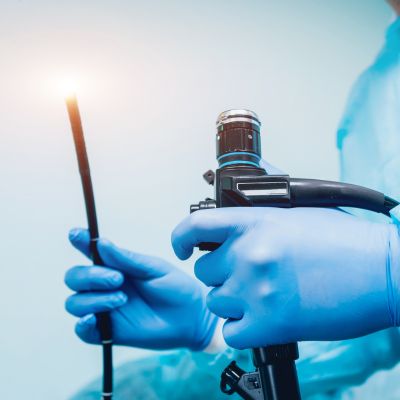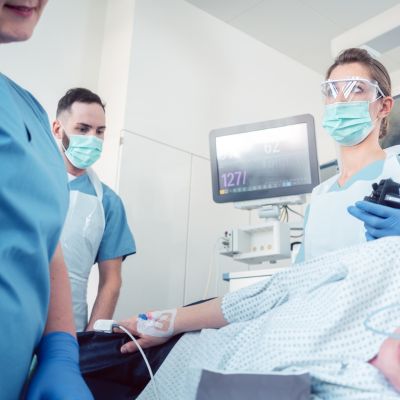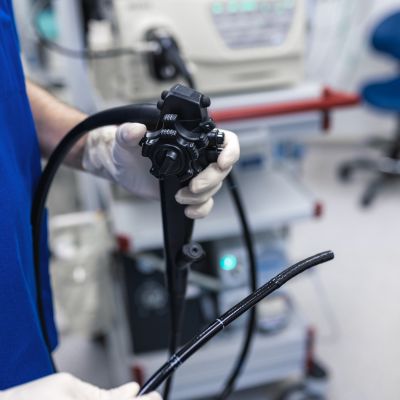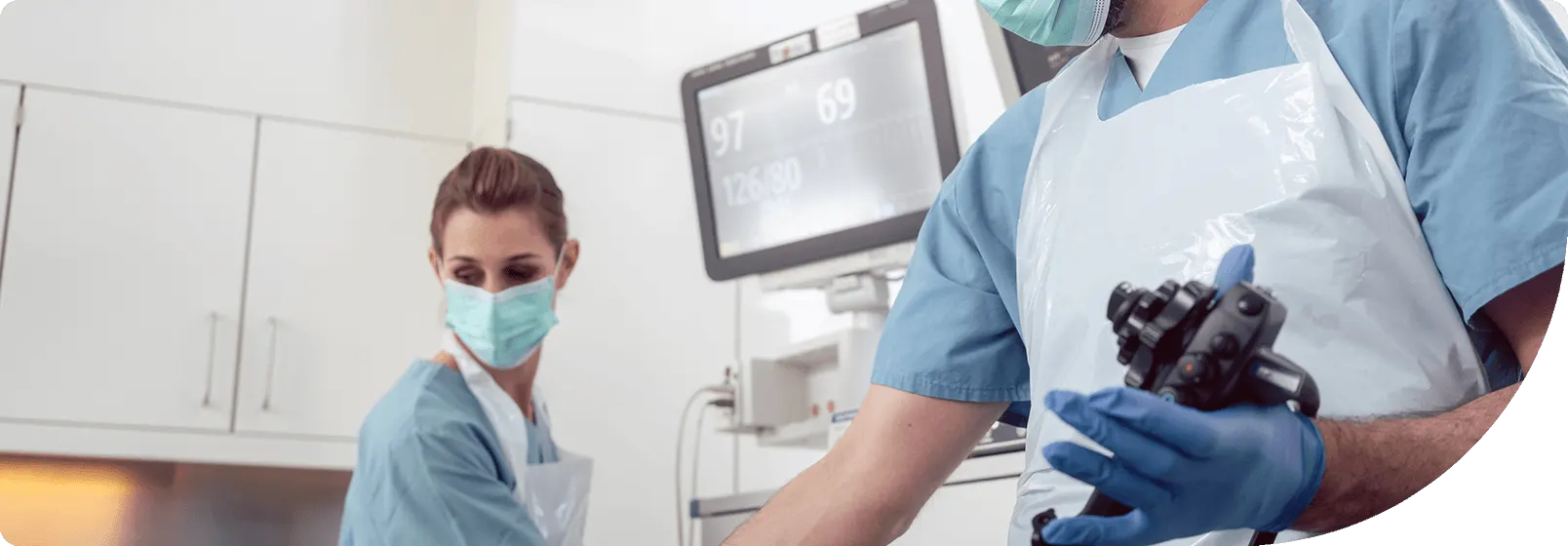A colonoscopy is the examination of the colon (large intestine) using a flexible tube with a camera attached to it, known as a colonoscope. Commonly used for both diagnostic and preventive purposes, it allows our surgeons to detect and address various conditions such as:
The primary objectives of a colonoscopy include the identification and removal of polyps, which are abnormal growths that can potentially develop into cancer over time.
Additionally, a colonoscopy allows for the detection of any:
- Inflammation
- Bleeding
- Infections
Colonoscopies play a crucial role in colon cancer screenings. This enables early detection and intervention, significantly improving outcomes.
Preparing for a colonoscopy may involve dietary restrictions and bowel cleansing. Despite these inconveniences, the benefits of this procedure in terms of early detection and prevention of colorectal diseases make it an essential tool in maintaining colon health.
Colonoscopy in Evansville, Indiana
Evansville Surgical Associates is dedicated to delivering exceptional surgical care in Evansville, IN, and the tri-state area. With a team of board-certified and fellowship-trained surgeons, we lead the field in diagnostic, preventative, and surgical advancements. This ensures the highest quality patient experience throughout the entire colonoscopy process.
When Should You Get One?
Generally, individuals with an average risk of colon cancer are advised to begin screening at the age of 45. Earlier screenings may be recommended if you have a family history of:
- Colon cancer
- Ovarian cancer
- Uterine cancer
Other risk factors include being overweight and smoking. Having an inflammatory bowel disease such as Crohn’s or ulcerative colitis also increases your risk.
Your frequency of colonoscopies depends on the findings after your screening. If the results are normal, a repeat may be recommended every 10 years. However, more frequent screenings may be advised if polyps or other abnormalities are discovered. Always consult with your doctor to determine a screening schedule based on your individual health history and risk factors.
Signs That You’re Having Colorectal Problems
Signs that it’s time for a colonoscopy include persistent:
- Rectal bleeding
- Unexplained weight loss
- Abdominal pain
- Prolonged diarrhea or constipation
- Fatigue
Early detection of colorectal cancer and other issues through colonoscopies improves the chances of a successful intervention and overall colorectal health. If you’re experiencing symptoms, call your doctor immediately.
Why Are Colonoscopies Important?
Colonoscopy age recommendations and guidelines have been established to detect and prevent colorectal cancer—a leading cause of cancer-related deaths. It’s discovered in 1 out of every 20 people, making it a particular concern for patients and doctors alike.
Colonoscopies play a crucial role in:
- Identifying and removing precancerous polyps
- Reducing the overall risk of colorectal cancer
- Improving the chances of successful treatment if cancer is detected
Colorectal cancer ranks among the leading causes of cancer-related deaths globally. Colonoscopies help identify the cancer at its earliest and most treatable stages.
Colorectal cancer often begins as small, non-cancerous polyps in the colon or rectum. Over time, these polyps may develop into cancer. During a colonoscopy, we examine the entire length of the colon to detect these precancerous polyps.
Early detection is key because colorectal cancer may not present noticeable symptoms in its initial stages. As symptoms become apparent, the cancer may have advanced, making treatment more challenging.
Colonoscopies enable our surgeons to catch the disease in its infancy. This provides a window for effective intervention and treatment, resulting in an improved prognosis for your condition. Regular screenings, especially for individuals at higher risk, contribute significantly to reducing colorectal cancer mortality rates and enhancing overall health outcomes.
 What to Expect, How to Prepare, and Recovery
What to Expect, How to Prepare, and Recovery
You can expect a comprehensive and relatively painless examination during a colonoscopy with the procedure taking place at one of our campuses. Before your procedure, you’ll receive a sedative to ensure that you’re relaxed and comfortable during the process.
Once sedated, a colonoscope is gently inserted through the rectum and advanced through the entire length of the colon. The camera transmits real-time images to a monitor, allowing your doctor to thoroughly inspect the colon’s lining for abnormalities like:
- Polyps
- Inflammation
- Tumors
If any polyps are detected, they may be removed or biopsied for further analysis.
Colonoscopies usually last between 30 to 60 minutes. Some patients may experience mild bloating or gas afterward, but discomfort is generally minimal. The insights gained contribute to the early detection and prevention of colorectal issues, making it a valuable tool for maintaining gastrointestinal health.
How to Prepare
Preparation for a colonoscopy is a crucial aspect to ensure its effectiveness. Typically, you’ll be instructed to follow a specific pre-procedure regimen to thoroughly cleanse the colon. This often involves adhering to a clear liquid diet for a day or two before the scheduled procedure.
Clear liquids may include:
- Water
- Broth
- Clear juices
- Gelatin
Additionally, you’ll usually be required to take laxatives or special bowel-cleansing solutions prescribed by your doctor. This step is crucial for emptying the colon of any residual stool, allowing for a clear and unobstructed view during the examination. Adequate hydration is also emphasized during the preparation phase.
It’s important to inform us about any medications that you’re taking. You should also let us know about any allergies or existing medical conditions you may have. This allows us to make any adjustments that may be necessary. Following these steps ensures a successful and accurate colonoscopy, enabling our team to identify and address potential issues within the colon.
Recovery
You’ll spend some time in a recovery area until the sedative effects wear off after your colonoscopy. While mild bloating or gas may occur, most individuals can resume normal activities the next day.
It’s recommended to have a companion for the journey home, as sedation may temporarily impact coordination. Patients are advised to avoid driving, operating machinery, or making important decisions for the remainder of the day.
Any discomfort or unusual symptoms should be promptly reported to your doctor. Follow-up discussions are often scheduled to review findings and discuss any necessary post-procedure care or further steps.
Common Concerns About Colonoscopies
Common concerns about colonoscopies often revolve around anxieties about the procedure itself and its potential outcomes. One prevalent fear is receiving unfavorable results, particularly the diagnosis of colorectal issues or cancer. This fear can be helped by understanding that early detection through colonoscopies significantly improves treatment outcomes.
Concerns about privacy and dignity are also common since patients may worry about the invasive nature of the procedure. It’s essential to recognize that healthcare professionals prioritize patient comfort. This ensures a respectful and discreet environment during the examination.
Potential complications are another common concern that can deter some from undergoing colonoscopies. However, these screenings are generally safe and complications are rare. Open communication with your doctor is key to addressing these fears. They can provide information, offer reassurance, and tailor the experience to ensure a more comfortable and positive process.
Risks
Like many medical procedures, colonoscopies are generally safe. On the other hand, they also carry potential risks just like other medical procedures.
This includes rare complications such as:
- Perforation of the colon
- Bleeding
- Infections
- Adverse reactions to anesthesia or sedation
The likelihood of complications is influenced by factors like patient health and the presence of pre-existing conditions. Despite these risks, the overall safety of colonoscopies remains high with the potential benefits often outweighing the potential drawbacks.
Ready to take the next step?
Request an appointment!
Related Articles

What’s Causing the Increase in Colon Cancer in Young Adults?
If you think you don’t have to worry about colon cancer until your golden years, think again. The truth is that the risk of colon cancer in young adults is larger than you realize. But

Colon Cancer Screening Pledge
Evansville Surgical Associates’ surgeon Dr. Anthony Kaiser has joined with Deaconess Hospital in their pledge to increase colon cancer screenings to 80% by 2018 as part of National Colorectal Cancer Awareness Month. Colon cancer is
The Five W’s of Colonoscopy
Why? As the only physician in my family, it is fairly common for family members to approach me for medical advice. As everyone ages, the complexity and range of questions continues to expand. Often I

